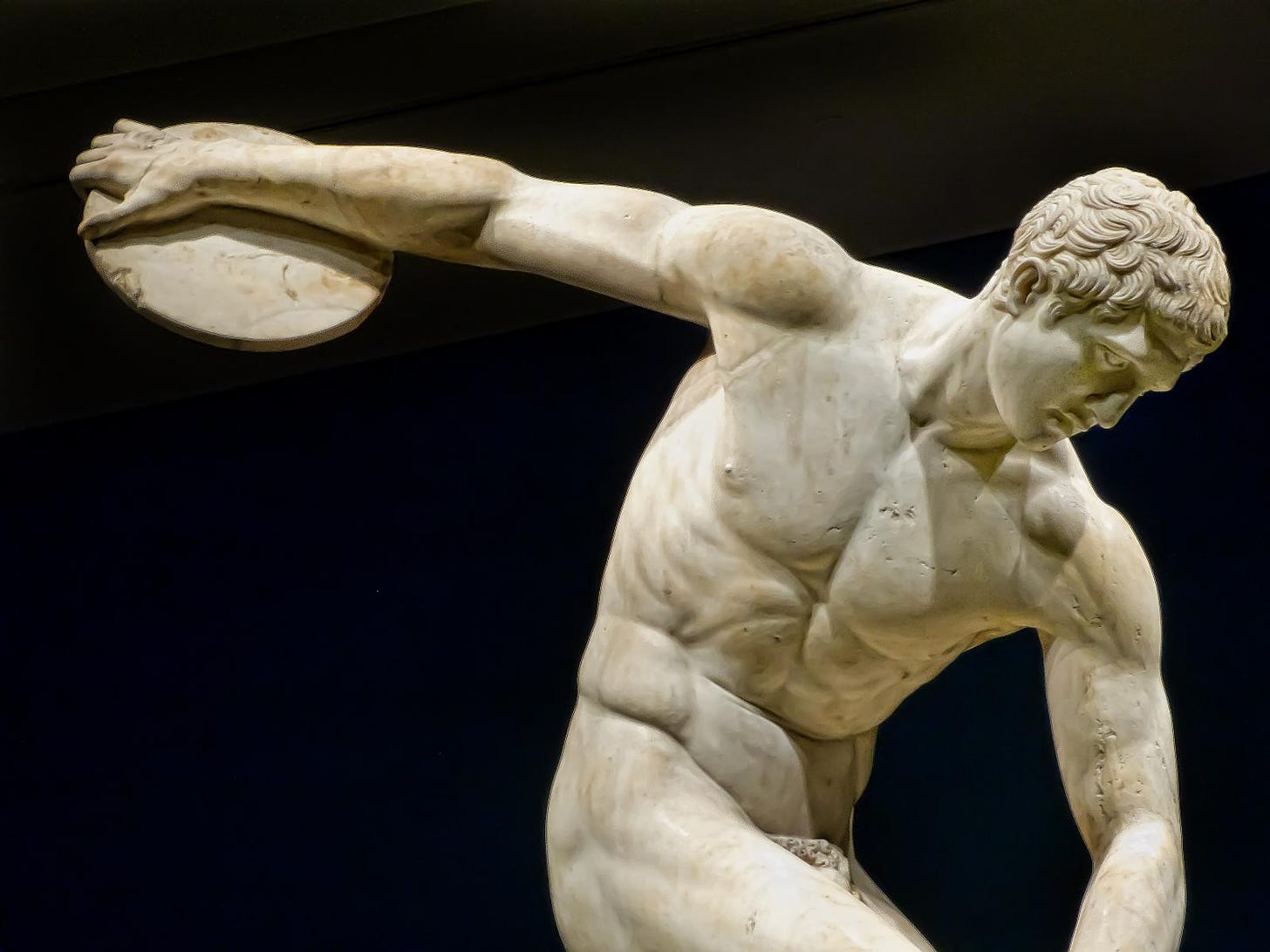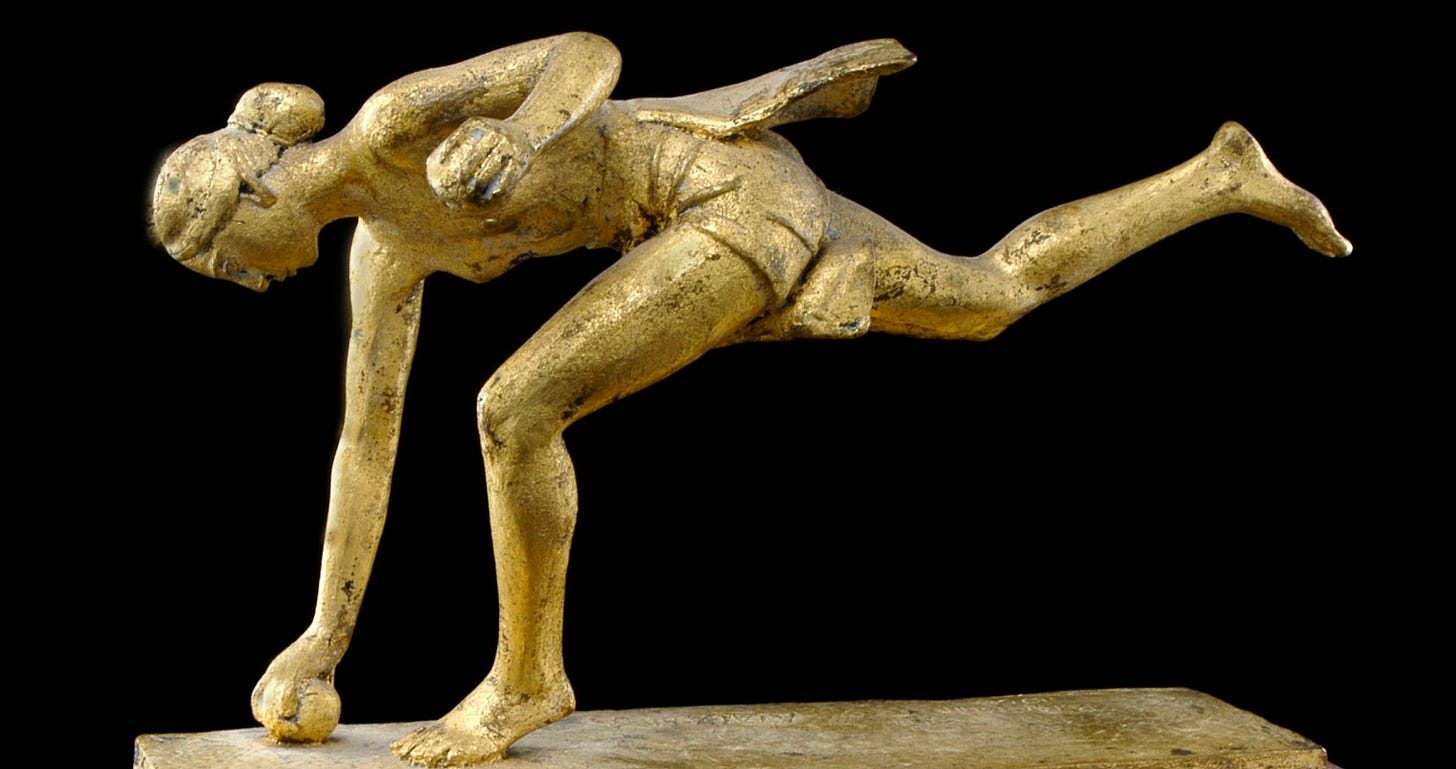
Dear Classical Wisdom reader,
There is a time in life for gravity and a time for levity... a moment when one should ponder the great philosophical conundrums of the ages as well as bask in the silliness of it all... there is space for both being reverent... and flippant.
And so it is with this shifting frame of mind that we ask you to read today’s issue... In honor of the Olympics and the ancient world’s dedication to sport and exercise, we thought it would be appropriate to humbly offer a fitness program that would appeal to both the brain and the brawn... a potential path to attaining the ever elusive Greek God Bod... all while being a bit cheeky (if you can pardon the pun).
Now, please don’t take said programme too seriously, lest we get accused of initiating a nudist movement at the gym (I believe the ancient Greek goddess Hygieia would balk at such a thought). Instead, delve into an important element of the ancient world below - that of both a healthy mind as well as a healthy body - and discover how you can hurl like Hector or run like Atalanta, below…
All the best,
Anya Leonard
Founder and Director
Classical Wisdom
P.S. If you are enjoying the Olympics and want to understand a lot of the important underlying history and context of the games, don’t miss our recent Classical Wisdom Magazine, dedicated to Ancient Sport. Members can access it here and if you haven’t yet joined our community, and would like to unlock all our member’s benefits, including this article and 1,000’s more like it, please feel free to join us right here:
Fitness Tips from Ancient Greece
Written by M. Reed Myers
If you are like most people, you probably wonder what life would be like if you had the body of a Greek god. You wonder what doors would open for you if you had the kind of physique that only a Praxiteles would be fit to sculpt.
Wonder no more, dear reader. This article presents fitness concepts derived from the best of classical Greek sculpture, pottery, and literature, adapted for us all-too-human moderns.
Read on: adventure and heroic stature await you.
Sing. O muse, and bid your listeners consult with Asclepius before beginning any of these programs.
Think and Thrive
The gymnasia was at the center of ancient Greek physical education. Based on the word-root gymno, meaning “naked,” physical exercise at the gymnasium was done mostly in the nude, under the gaze of gymnastes, or coaches. Because the student’s body was completely observable, the coach could accurately diagnose physical limitations and develop an individualized training plan.
Archaeologists have excavated gymnasia in such sites as Athens, Delphi, Epidarus, Eretria, Olympia, and even Priene in the Greek islands. By the 5th century BC, the gymnasia offered more than just physical training. Students also received basic physical therapy, listened to lectures, watched dramatic presentations, and enjoyed poetic recitations. All these elements reinforced the overarching Greek culture, with a heavy emphasis on honoring the Olympian gods and semi-divine heroes.
A major problem with this system, of course, was its exclusion of women. Although Spartan women were somewhat freer, no woman in ancient Greece could exercise the same rights and freedoms as their male peers. This is not the case with these exercises. They are designed to exercise the major muscle groups and can be of benefit to either gender.
A common motif in Greek black-figure pottery was the depiction of male figures performing various exercises common to the gymnasium. Think and Thrive is a workout that builds on these art motifs to create a balanced, healthy physique with lower body, core, and upper body elements. As you progress from one exercise to the next, maintain a steady pace. Regarding exercise intensity, you should be able to speak in short sentences, but not dramatic monologues.
You will need a large open field, preferably with an oval or circular track at the perimeter, a frisbee or other throwing disk, and a weighted object you can grasp with both hands (like a kettlebell). At one side of the field, place your throwing disk, on the other side of the field place your kettlebell or other weight.
Strophe: if you are exercising by yourself and have access to audiobooks, listen to a major section of any of the following: the Iliad, Works and Days, or any of the myths of Theseus or Heracles. While listening, jog at a moderate pace around the perimeter of the field and ponder the crucial lessons you are hearing. If you do not have access to audiobooks, ask an exercise partner to chant the section aloud to you, while you jog in a smaller circle around your partner.
Antistrophe: Six sets of the following exercises.
Hurl like Hektor: Hold your flying disk in both hands, with arms extended. With your feet shoulder-width apart, and your weight balanced on both feet, slowly rotate your upper body from right to left, until you reach 100. Throughout, tighten your core and abdomen (as though you were bracing to receive a punch). When you reach 100 rotations, throw your flying disc across the field toward your kettle bell or other weight.
Run like Atalanta: While your flying disc is in the air, sprint as quickly as you can after it. Pick it up on the run and sprint with it back to your starting point. Bonus points if you are able to catch it on the fly!
Row like Jason: Before you regain your breath after your sprint, drop your flying disk and lift your kettlebell or other weight. Stand upright with your feet hip-width apart and the weight resting across your thighs. Tighten your abdomen again, pull your shoulders back, lift your chest and keep your lower back in its natural curve. Keeping the weight close to your body, pull upwards while extending your elbows. Lift the weight until it is just under your chin. Slowly lower the weight back to full extension. Breathe in and out throughout the exercise. For the basic exercise, do one repetition for each of the 12 labors of Heracles. For advanced exercise do one repetition in honor of each of the argonauts.
Epode: listen to your selection once again while jogging around the perimeter. Think about the implications of the lesson for your community and for all the Greeks. This workout can be done 3 – 4 times per week, with rest days interspersed. Alternate upper body exercises could include shoulder shrugs rather than upright rows or bicep curl to shoulder press.
The Heraean Games
Greek physical fitness was initially based on the principle that civic survival depended on having physically strong, resilient citizen soldiers. The epitome of this perspective was Sparta.
As the readers of Classical Wisdom know, Sparta’s political relevance in Greece depended on its ability to produce highly disciplined warriors who could simultaneously subdue its helot slaves and intimidate its political rivals.
It is said that when Philip II of Macedon was expanding his control over Greece in 346 BC, he sent an imperious demand to the Spartans, demanding their submission: “If I bring my forces into your land, I will ravage your homesteads, massacre your people, and destroy your city.”. The Spartans are said to have warned him off with one word: “If.”
It is worth remembering that this apocryphal encounter would have taken place about a generation after Sparta’s forces were soundly defeated by Thebes in the Battle of Leuctra (371 BC). Sparta’s diminished reputation alone was still strong enough to unnerve Philip.
One of the surprises in Spartan society was the unique status of elite women. Physical health was considered absolutely vital for the growing girl, because her health affected her ability to bear children for the Spartan state. Towards this end, girls were well fed, were encouraged to exercise, play sports, and to stay physically active throughout life. While Spartan married women did not take part in foot races, they were encouraged to dance and stay physically active.
For this workout, you will need an oval track and sandbag or other weighted sack with handles. Fill it with a weight that challenges you to complete the exercises. This workout is named in honor of the Heraean races, a pan-hellenic race for unmarried Greek women. Although the Heraean games were specifically for females, this work out can be used by either gender.
[Learn more about the “olympics for women” in our recent Classical Wisdom Litterae Magazine, dedicated to ancient sport. Members can enjoy this edition, as well as our full archive. If you aren’t a member yet, make sure to subscribe to enjoy!]
Strophe: Place your sandbag at the starting point on the track. Then, slowly jog one lap around the open field for each of the kings of Sparta. Afterwards, proceed to forward lunges, to emulate the Spartan running girl statue: hold for 30 seconds per leg. One set for each king. Then, split stretch, as low as you can go; lean forward and hold for 30 seconds. Then, a forward bend stretch for 30 seconds to look down upon the helots.
Antistrophe: for helots, 3 sets; for maidens, 4 sets; for matrons, 5 sets.
Run 1 lap around the track.
Carrying your shield or on it: Placing your feet approximately shoulder width apart, bend forward and hold your sandbag with your arms fully extended and knees slightly bent. Keep your back in its natural curve. As you tighten your core, lift the sandbag with both arms until it almost touches your chest, then slowly lower it. Repeat the lift 8 times. That’s one set.
Run another lap around the field.
At your command: Lift the sandbag across your shoulders, feet shoulder width apart. Hold the sandbag tight against your upper shoulders but not pressing on your neck. Bend forward until your upper body is parallel to the ground. Do this eight times. That’s one set.
No further laps, Sparta has only 2 kings.
Uplifting the Spartan warriors: keeping the sandbag on your shoulders, drop into a basic squat, your thighs parallel to the ground. Rise to standing. Do this eight times. That’s one set.
Epode: To cool down, jog around the track twice more. Reflect on the fact that there are eight helots for every one Spartan. This workout can be done 2-3 times per week.
The Himantes of Heaven
No discussion of ancient Greek fitness is complete without mentioning the great sporting/religious festivals of the Classical era. These included the Olympic games, Pythian games, Nemean games, and Isthmian games. Of these, the premier event was the Olympics.
Más info en https://ift.tt/aGt2MRY / Tfno. & WA 607725547 Centro MENADEL (Frasco Martín) Psicología Clínica y Tradicional en Mijas. #Menadel #Psicología #Clínica #Tradicional #MijasPueblo
*No suscribimos necesariamente las opiniones o artículos aquí compartidos. No todo es lo que parece.





No hay comentarios:
Publicar un comentario